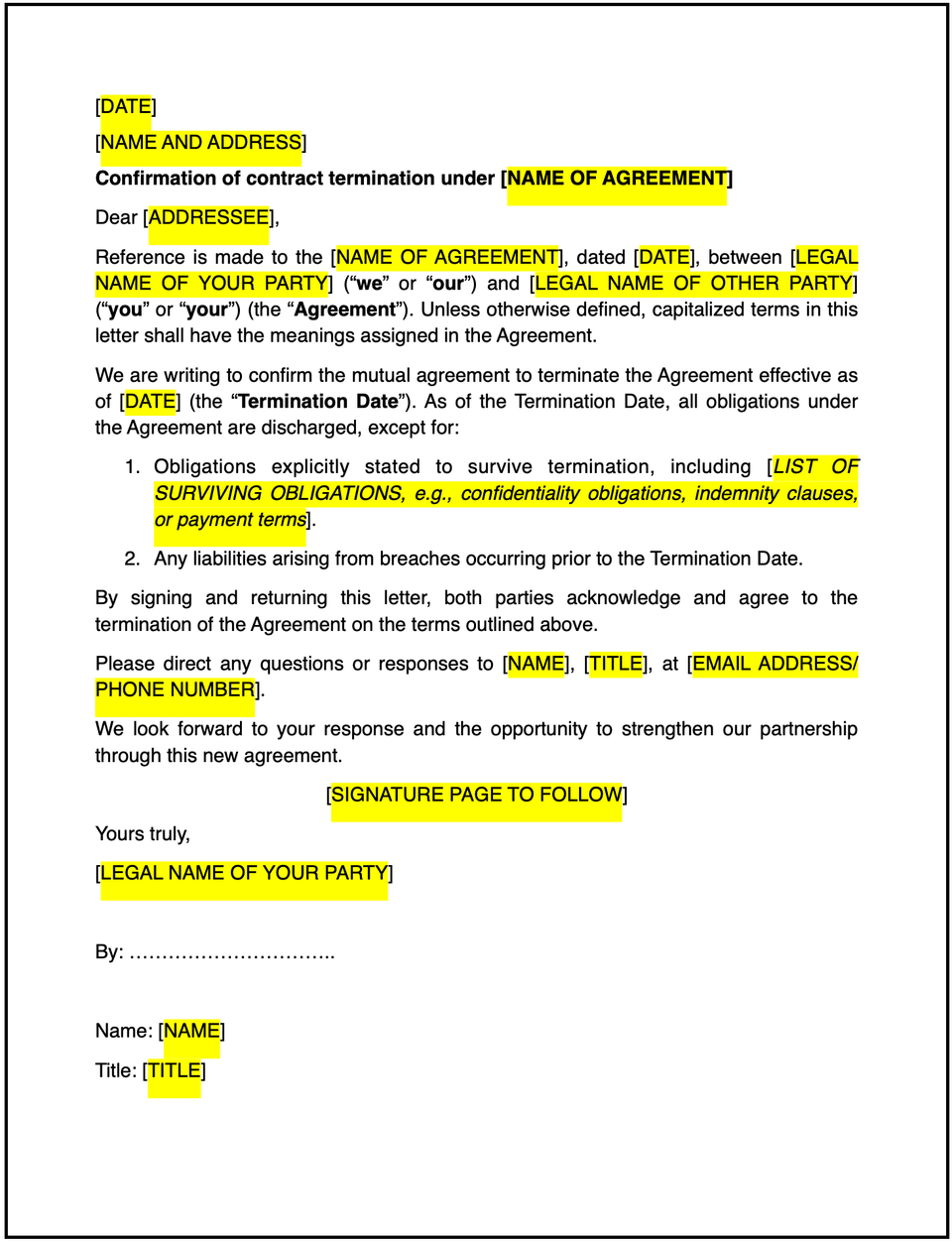Confirmation of contract termination letter: Free template

Confirmation of contract termination letter
Confirming the termination of a contract is a critical step to formalize the conclusion of an agreement and ensure all parties are clear about the terms and next steps. This letter provides a professional way to confirm the termination, reference key terms, and outline any final actions or responsibilities.
How to use this confirmation of contract termination letter
- Reference the terminated contract: Clearly state the contract title, reference number, and the parties involved to avoid any ambiguity.
- Customize the template: Replace placeholders with your organization’s details, the termination details, and any applicable final actions.
- Confirm termination details: Specify the effective termination date and reference any relevant contract clauses or mutual agreements.
- Address final obligations: Outline any remaining responsibilities, such as final payments, return of materials, or outstanding deliverables.
- Maintain a professional tone: Ensure the letter is respectful and clear, focusing on finalizing the agreement amicably.
- Retain a copy: Keep a record of the termination letter for your files as part of the contract documentation.
Benefits of using a confirmation of contract termination letter
This letter template ensures a professional and transparent way to confirm contract termination while addressing final responsibilities. Here’s how it helps:
- Provide clarity: The letter confirms the termination and eliminates any misunderstandings about the agreement’s status.
- Maintain professionalism: A formal confirmation reflects respect and helps preserve a positive relationship with the other party.
- Address final actions: By outlining remaining obligations, the letter ensures all parties are clear on what needs to be completed.
- Simplify record-keeping: The letter serves as a formal record of the termination, which is useful for auditing or reference purposes.
- Demonstrate accountability: Confirming termination in writing emphasizes your organization’s commitment to clear communication and proper closure.
Tips for writing an effective confirmation of contract termination letter
- Be specific: Clearly reference the contract title, reference number, and termination date to avoid ambiguity.
- Confirm terms: Explicitly state the reason for termination and reference any relevant contract clauses or agreements.
- Outline final actions: Include a clear summary of any remaining obligations or deliverables to ensure all parties are aligned.
- Use professional language: Maintain a respectful tone, even if the termination was not amicable, to preserve professionalism.
- Keep it concise: Focus on the key details and avoid unnecessary explanations or commentary.
Frequently asked questions (FAQs)
Q: What details should I include in this letter?
A: Include the contract title, reference number, termination date, reason for termination, and any final obligations.
Q: Should I reference specific contract clauses?
A: Yes, if applicable, reference the termination clause or mutual agreement that supports the termination.
Q: Who typically receives this letter?
A: Send the letter to the other party or parties involved in the contract, typically the point of contact or legal representative.
Q: How formal should this letter be?
A: The tone should be professional and respectful, reflecting the importance of clearly communicating the termination.
Q: When should this letter be sent?
A: Send the letter as soon as the termination is finalized to ensure all parties are informed promptly.
Q: Can this letter include final payment details?
A: Yes, if applicable, include details of any final payments, refunds, or settlements required under the contract terms.
Q: Is this letter necessary for verbal terminations?
A: Yes, confirming termination in writing is essential to formalize the agreement and provide a clear record.
This article contains general legal information and does not contain legal advice. Cobrief is not a law firm or a substitute for an attorney or law firm. The law is complex and changes often. For legal advice, please ask a lawyer.


